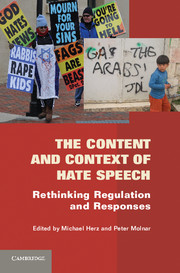Book contents
- Frontmatter
- Contents
- Contributors
- Foreword: Hate Speech and the Coming Death of the International Standard before It Was Born (Complaints of a Watchdog)
- Foreword: Hate Speech and Common Sense
- Acknowledgments
- Introduction
- Part I Overviews
- Part II Refinements and Distinctions
- 7 Social Epistemology, Holocaust Denial, and the Post-Millian Calculus
- 8 Denying Experience
- 9 What's Wrong with Defamation of Religion?
- 10 Responding to “Hate Speech” with Art, Education, and the Imminent Danger Test
- 11 Reconceptualizing Counterspeech in Hate Speech Policy (with a Focus on Australia)
- 12 Hate Speech and Self-Restraint
- 13 Hate Speech in Constitutional Jurisprudence
- 14 One Step Beyond Hate Speech
- 15 Hate Speech and Comprehensive Forms of Life
- Part III Equality and Fear
- Part IV International Law
- Index
- References
9 - What's Wrong with Defamation of Religion?
Published online by Cambridge University Press: 05 June 2012
- Frontmatter
- Contents
- Contributors
- Foreword: Hate Speech and the Coming Death of the International Standard before It Was Born (Complaints of a Watchdog)
- Foreword: Hate Speech and Common Sense
- Acknowledgments
- Introduction
- Part I Overviews
- Part II Refinements and Distinctions
- 7 Social Epistemology, Holocaust Denial, and the Post-Millian Calculus
- 8 Denying Experience
- 9 What's Wrong with Defamation of Religion?
- 10 Responding to “Hate Speech” with Art, Education, and the Imminent Danger Test
- 11 Reconceptualizing Counterspeech in Hate Speech Policy (with a Focus on Australia)
- 12 Hate Speech and Self-Restraint
- 13 Hate Speech in Constitutional Jurisprudence
- 14 One Step Beyond Hate Speech
- 15 Hate Speech and Comprehensive Forms of Life
- Part III Equality and Fear
- Part IV International Law
- Index
- References
Summary
In March 2010, in Geneva, the UN's Human Rights Council (HRC) voted by a narrow margin to accept a nonbinding Resolution on “Combating Defamation of Religions.” (Hereafter, “the Resolution.”) Resolutions like this one have been offered regularly at the HRC and in the General Assembly, have the support of the Organization of the Islamic Conference (OIC) and the Arab League, and have passed regularly over the last decade in all of these various fora. I think this widespread support is regrettable and I hope that this idea does not gain a serious foothold in international human rights law. In fact, the Resolution had less support in March 2010 than it had had in the past and, as this volume goes to press, it appears that the resolution's proponents have abandoned their efforts, at least for the foreseeable future. I am glad that this is so, and in this chapter I want to explain why. To do this, I will have first to say something about the considerations that I think favor laws against defamation in general; my aim is to make the best case for legal sanctions against defamation of religion in particular before recommending against such legal sanctions.
The Background
The Resolution weaves the concept of “defamation of religion” into a text that endorses many other more conventional moral and legal ideas. The text “strongly deplores” violence and incitement to violence, both physical and psychological, directed against people on the basis of religious belief, for example, and urges governments to offer legal protections to their targets, as well as to religious “places, sites, shrines and symbols” threatened with destruction. What reasonable person could object to that? (Although one might quibble that states ought ordinarily to protect people and property from violence, whether or not it is motivated by hostility to their religion.)
- Type
- Chapter
- Information
- The Content and Context of Hate SpeechRethinking Regulation and Responses, pp. 164 - 182Publisher: Cambridge University PressPrint publication year: 2012
References
- 5
- Cited by



